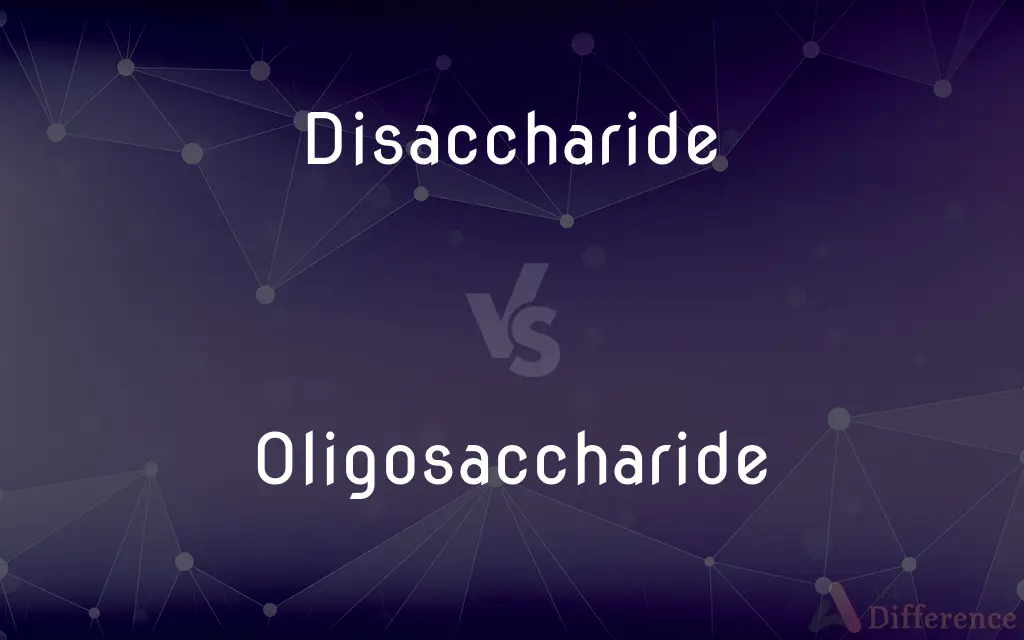Disaccharide vs. Oligosaccharide — What's the Difference?
By Tayyaba Rehman & Maham Liaqat — Updated on April 4, 2024
Disaccharides are carbohydrates formed by two monosaccharides, while oligosaccharides consist of 3-10 monosaccharide units.

Difference Between Disaccharide and Oligosaccharide
Table of Contents
ADVERTISEMENT
Key Differences
Disaccharides, such as sucrose and lactose, are a type of carbohydrate that consists of two monosaccharide molecules bonded together. These sugars are commonly found in foods and serve as important energy sources. On the other hand, oligosaccharides are slightly more complex carbohydrates that are made up of 3 to 10 monosaccharide units, found in various plant-based foods and known for their prebiotic effects, promoting gut health.
The primary difference between the two lies in the number of monosaccharide units they contain. Disaccharides, with only two units, are simpler and often taste sweet, making them common in the human diet. Oligosaccharides, however, due to their complexity, are less sweet and not digestible without the aid of gut bacteria. They play a crucial role in supporting digestive health by fostering a healthy microbiome.
While disaccharides are broken down into their monosaccharide components by enzymes in the small intestine for absorption, oligosaccharides may reach the large intestine intact. There, they serve as food for beneficial gut bacteria, which ferment them into short-chain fatty acids that provide various health benefits. This process highlights the prebiotic nature of oligosaccharides, which is not a feature of disaccharides.
In terms of dietary sources, disaccharides are found in sugar cane, beets, milk, and dairy products, providing immediate energy upon consumption. Oligosaccharides are present in foods like legumes, whole grains, and certain vegetables, contributing to long-term gut health rather than immediate energy. This reflects the functional differences between these two types of carbohydrates in human nutrition.
Despite their differences, both disaccharides and oligosaccharides play important roles in the diet. Disaccharides are key for quick energy needs, while oligosaccharides contribute to gut health and have potential benefits for immune function due to their prebiotic properties. Understanding these differences is crucial for nutrition and health.
ADVERTISEMENT
Comparison Chart
Monosaccharide Units
2
3-10
Taste
Sweet
Less sweet, sometimes not sweet at all
Digestibility
Easily digestible, broken down in the small intestine
Require gut bacteria for digestion
Role in Diet
Provide immediate energy
Support digestive health, have prebiotic effects
Dietary Sources
Sugar cane, beets, milk, dairy products
Legumes, whole grains, certain vegetables
Compare with Definitions
Disaccharide
Easily broken down into monosaccharides for absorption.
Lactase enzyme breaks down lactose, a milk sugar, into glucose and galactose.
Oligosaccharide
Less sweet or not sweet, depending on the structure.
The slight sweetness in whole grains is partly due to oligosaccharides.
Disaccharide
A carbohydrate made up of two monosaccharide molecules.
Table sugar, or sucrose, is a disaccharide composed of glucose and fructose.
Oligosaccharide
Carbohydrates composed of 3-10 monosaccharide units.
Fructooligosaccharides (FOS) are oligosaccharides found in onions and garlic.
Disaccharide
Provide immediate energy for bodily functions.
Consuming disaccharides during exercise can quickly replenish energy levels.
Oligosaccharide
Present in plant foods like legumes, onions, and asparagus.
Chicory root is a rich source of inulin, a type of oligosaccharide.
Disaccharide
Typically sweet.
The sweetness in your morning coffee comes from sucrose, a disaccharide.
Oligosaccharide
Fermented by gut bacteria in the large intestine.
Oligosaccharides in beans feed beneficial gut bacteria, promoting digestive health.
Disaccharide
Found in foods like fruits, vegetables, milk, and honey.
Beets and sugar cane are rich sources of sucrose.
Oligosaccharide
Support gut health and have prebiotic effects.
Oligosaccharides can improve the balance of gut microbiota, supporting overall health.
Disaccharide
A disaccharide (also called a double sugar or biose) is the sugar formed when two monosaccharides are joined by glycosidic linkage. Like monosaccharides, disaccharides are simple sugars soluble in water.
Oligosaccharide
An oligosaccharide (/ˌɑlɪgoʊˈsækəˌɹaɪd/; from the Greek ὀλίγος olígos, "a few", and σάκχαρ sácchar, "sugar") is a saccharide polymer containing a small number (typically three to ten) of monosaccharides (simple sugars). Oligosaccharides can have many functions including cell recognition and cell binding.
Disaccharide
Any of a class of sugars, including lactose and sucrose, that are composed of two monosaccharides.
Oligosaccharide
A carbohydrate that consists of a relatively small number of monosaccharides.
Disaccharide
(carbohydrate) Any sugar, such as sucrose, maltose and lactose, consisting of two monosaccharides combined together.
Oligosaccharide
(carbohydrate) A polysaccharide of low molecular weight, being a polymer of between three and eight monosaccharide units.
Disaccharide
Any of a variety of carbohydrates that yield two monosaccharide molecules on complete hydrolysis
Oligosaccharide
Any of the carbohydrates that yield only a few monosaccharide molecules on complete hydrolysis
Common Curiosities
What are some common dietary sources of disaccharides?
Sugar cane, beets, and dairy products are rich in disaccharides.
How do oligosaccharides benefit gut health?
By feeding beneficial bacteria, they help maintain a healthy digestive system.
Can the human body digest oligosaccharides?
Not directly; they are fermented by gut bacteria in the large intestine.
What role do disaccharides play in the body?
They provide immediate energy for bodily functions.
What are disaccharides and oligosaccharides?
Disaccharides are carbohydrates with two monosaccharide units, while oligosaccharides contain 3-10 units.
Do oligosaccharides have any side effects?
In some people, they can cause gas or bloating, particularly when consumed in large amounts.
Are oligosaccharides found in animal products?
They are primarily found in plant-based foods, not animal products.
Are all disaccharides naturally occurring?
While many are found in nature, some, like lactose-free milk sugar, are industrially modified.
Why are oligosaccharides considered prebiotics?
They nourish beneficial gut bacteria, promoting digestive health and immunity.
How do disaccharides and oligosaccharides differ in taste?
Disaccharides are generally sweet, while oligosaccharides are less sweet or not sweet.
Can eating disaccharides affect blood sugar levels?
Yes, their digestion releases glucose into the bloodstream, impacting blood sugar levels.
Can disaccharides cause digestive issues?
Yes, individuals with intolerances, such as lactose intolerance, may experience digestive discomfort.
Is sucrose a disaccharide or oligosaccharide?
Sucrose is a disaccharide, consisting of glucose and fructose units.
Why might someone choose foods high in oligosaccharides?
For their prebiotic effects and to support long-term digestive health and immunity.
How do oligosaccharides differ from polysaccharides?
Oligosaccharides have 3-10 sugar units, while polysaccharides have more than 10.
Share Your Discovery

Previous Comparison
Jalebi vs. Imarti
Next Comparison
Harmony vs. MelodyAuthor Spotlight
Written by
Tayyaba RehmanTayyaba Rehman is a distinguished writer, currently serving as a primary contributor to askdifference.com. As a researcher in semantics and etymology, Tayyaba's passion for the complexity of languages and their distinctions has found a perfect home on the platform. Tayyaba delves into the intricacies of language, distinguishing between commonly confused words and phrases, thereby providing clarity for readers worldwide.
Co-written by
Maham Liaqat















































